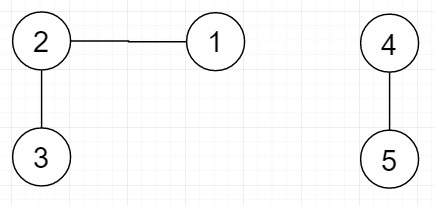
 Data Structure
Data Structure Networking
Networking RDBMS
RDBMS Operating System
Operating System Java
Java MS Excel
MS Excel iOS
iOS HTML
HTML CSS
CSS Android
Android Python
Python C Programming
C Programming C++
C++ C#
C# MongoDB
MongoDB MySQL
MySQL Javascript
Javascript PHP
PHP
- Selected Reading
- UPSC IAS Exams Notes
- Developer's Best Practices
- Questions and Answers
- Effective Resume Writing
- HR Interview Questions
- Computer Glossary
- Who is Who
Find all reachable nodes from every node present in a given set in C++
Suppose we have one undirected graph and a set of vertices; we have to find all reachable nodes from every vertex present in the given set.
So, if the input is like

then the output will be [1,2,3] and [4,5] as these are two connected components.
To solve this, we will follow these steps −
- nodes := number of nodes in the graph
- Define an array visited of size: nodes+1. And fill with 0
- Define one map m
- comp_sum := 0
- for initialize i := 0, when i < n, update (increase i by 1), do −
- u := arr[i]
- if visited[u] is false, then −
- (increase comp_sum by 1)
- m[visited[u]] := bfs traversal of g from node u, also calculate comp_sum
- print traversal of m[visited[u]]
Example
Let us see the following implementation to get better understanding −
#include <bits/stdc++.h> using namespace std; class Graph{ public: int nodes; list<int> *adj_list; Graph(int); void insert_edge(int, int); vector<int> BFS(int, int, int []); }; Graph::Graph(int nodes) { this->nodes = nodes; adj_list = new list<int>[nodes+1]; } void Graph::insert_edge(int u, int v) { adj_list[u].push_back(v); adj_list[v].push_back(u); } vector<int> Graph::BFS(int comp_sum, int src,int visited[]){ queue<int> queue; queue.push(src); visited[src] = comp_sum; vector<int> reachableNodes; while(!queue.empty()) { int u = queue.front(); queue.pop(); reachableNodes.push_back(u); for (auto itr = adj_list[u].begin(); itr != adj_list[u].end(); itr++) { if (!visited[*itr]) { visited[*itr] = comp_sum; queue.push(*itr); } } } return reachableNodes; } void displayReachableNodes(int n, unordered_map <int, vector<int> > m) { vector<int> temp = m[n]; for (int i=0; i<temp.size(); i++) cout << temp[i] << " "; cout << endl; } void get_all_reachable(Graph g, int arr[], int n) { int nodes = g.nodes; int visited[nodes+1]; memset(visited, 0, sizeof(visited)); unordered_map <int, vector<int> > m; int comp_sum = 0; for (int i = 0 ; i < n ; i++) { int u = arr[i]; if (!visited[u]) { comp_sum++; m[visited[u]] = g.BFS(comp_sum, u, visited); } cout << "Reachable Nodes from " << u <<" are\n"; displayReachableNodes(visited[u], m); } } int main() { int nodes = 5; Graph g(nodes); g.insert_edge(1, 2); g.insert_edge(2, 3); g.insert_edge(4, 5); int arr[] = {2, 4, 1}; int n = sizeof(arr)/sizeof(int); get_all_reachable(g, arr, n); } Input
g.insert_edge(1, 2); g.insert_edge(2, 3); g.insert_edge(4, 5);
Output
Reachable Nodes from 2 are 2 1 3 Reachable Nodes from 4 are 4 5 Reachable Nodes from 1 are 2 1 3

Advertisements
